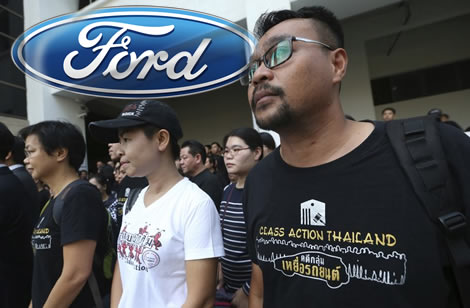Thailand’s first consumer class action against Ford was a historic win for consumers, Thailand’s auto industry, the Thai legal system and Ford itself
The South Bangkok Civil Court in September ordered Ford Sales & Service (Thailand) to pay compensation to nearly 300 customers who bought its Ford cars that developed technical problems with the transmission system and clutch, a decision widely hailed by consumer advocates. It was Thailand’s first class action against a large multinational firm taken by consumers, was heard relatively quickly and resulted in a decisive verdict in favour of the consumers when judgment was handed down last month.

After a $7.6 million fine was imposed by authorities in Australian- and numerous lawsuits in Canada and in the US related to a transmission issue with Ford’s popular Focus and Fiesta models manufactured between 2011 and 2015, it looked like the Ford Motor company had received yet another blow in September when the Thai court handed down the award to plaintiffs against the company. But the judgement of the court had some silver lining for Ford who quickly promised to accept the ruling and later issues a statement pointing out that the court has agreed with its position in addressing the problem with its customers.
Thai court failed to adjudicate Ford cars as substandard
The South Bangkok Civil Court ruled on September 21st that Ford Thailand had to pay compensation to 291 car owners who had purchased motor vehicles from Ford which later developed issues. However it appears that Ford may have dodged a bullet as it could have faced the daunting prospect of being forced to issue a huge recall had the court held that all Ford cars manufactured in Thailand were substandard or defective. The Thai court, in fact, adjudicated that they were not. The court decision was certainly a victory for consumers in Thailand who can now see that, acting together in a united front, they have recourse to justice at a time when Thailand is experiencing an emerging and growing middle class with a huge demand among young Thai people to own their own cars.
Significant judgment of Thai court ordering Ford to pay compensation was also a partial victory as the firm’s position on the issue
The judgment handed down by the Thai court found that transmission issues and faults had been identified in a small proportion of Ford cars including the popular Ford Fiesta and Focus models. It was established that the Ford Motor company produced 90,000 vehicles a year in Thailand over three different models. Of these the company had identified 500 vehicles which had defects and problems with the company’s innovative and semi automatic Powershift transmission system, clutch and gearbox.
Court ordered Ford to pay lawyers fee and 800,000 baht reward for winning landmark case
Lawyers for the plaintiffs had claimed in court that there were problems with Ford vehicles since 2011. Ford has accepted that there were issues with its transmission system and had taken the view that its own repair and service programme was adequate to deal with each car owner on a case by case basis. The Thai court significantly did not rule that the cars sold by Ford could be classified as dangerous or sub standard goods. The court pointed out that there had, fortunately, been no injuries or deaths as a result of the defects. On this basis it did not have the power to order the company to purchase back the vehicles or to order a general recall. This was, in fact, a significant victory for Ford. The court ordered Ford to pay compensation to 296 plaintiffs who had joined together in Thailand’s first class action lawsuit taken by consumers against a large international conglomerate. The court also ordered Ford to pay out a fee of 150,000 baht to the lawyer who brought the case on behalf of the plaintiffs and a further 800,000 baht as a reward for winning the case.
Owners who converted cars or failed to send them for service lost out on compensation
The court ordered the compensation payments on the basis that the cars were not as described in advertisements and the owners were consequently entitled to compensation for repairs and other damage. Of the 308 plaintiffs, the Thai court found that only 296 were entitled to compensation. 13 of the plaintiffs were held by the court to be ineligible for compensation because it found that they had either converted their cars or failed to send them for regular maintenance service.
On that basis, Ford Motor was ordered to compensate the plaintiffs for sums ranging from 20,000 to 200,000 baht for each car owner. The total compensation was 23 million baht in addition to repair expenses. The court ordered the compensation to be paid within 7 days and stipulated an interest at the rate of 7.5 per year from the lawsuit date.
Speed of judicial process and resolution compares favourably with foreign jurisdictions
Another Impressive aspect of the case, from the point of Thai consumers, was the relatively speed that the court process took. The court case was taken on April 3rd 2017 when a Thai court accepted the case and set it for hearing in May this year. The speed of resolution of the matter compares quite favourably with many western courts where such cases can take many years to find their way to a final hearing or court judgment. The case was originally taken by 416 plaintiffs. Over 100 plaintiffs had reached out of court settlements and arrangements with Ford in the meantime. The defendant in the class action case was Ford Sales and Services (Thailand) Co. Ltd which had produced and marketed the cars to consumers in Thailand.
Historic victory for consumers but some were not completely satisfied and lawyers did not rule out an appeal on some aspects
Lawyers representing the plaintiffs have applauded the the verdict and described it as a historic victory for consumers as a whole. ‘If we consider this case, beyond the amount of money awarded, this shows that when consumers work together against any big company, we can achieve a victory,’ said Mr Jinna, one of the lawyers for the car owners who won their court case. The court ruling is all the more significant because it is the result of Thailand’s first ever first ever class action since the 2015 amended civil law which allows this kind of lawsuit. At the time of judgment it was reported that the legal team for the car owners were looking at some aspects of the judgment with a view to an appeal. Some of the plaintiffs were reported to be are not completely satisfied as the court’s ruling did not hold Ford’s responsible for future repairs that may be required because of the faults.
Ford Motor Co. Thailand in a statement accepted the judgment and praised some aspects
In the statement to the media, Ford affirmed that its transmission was safe while respecting the verdict and apologizing to its customers for the issue. Ford, one of the world’s automobile giants has successfully secured a considerable share of the largest car market in Southeast Asia. Its cars appeal to middle class users and there is also support for the brand. In its statement, which came quickly after the judgment, Ford stated that it respects the ruling of the Thai court handed down. It emphasised that the judgment accepted that the problems with the company’s Powershift transmission system, which the company had always accepted responsibility for, did not pose a danger to car owners or compromise the safety of its vehicles. The company also indicated its satisfaction that the court had adjudicated on the basis of each car owner being treated on a case by case basis. The company stated that this was ‘appropriate’. It also extended an apology. ‘We apologise for any inconvenience caused by issues related to the PowerShift transmission and remain committed to helping resolve any outstanding issues through our comprehensive customer satisfaction programmes.’
Ford in Thailand – a brief history
Thailand in the last few decades, through innovative government policy and the growing importance of the Thai consumer market in Asia, has become a centre of the Asian automotive industry. In the early 1960s Ford was one of the first international car brands to open in Thailand as a car manufacturer. In 1961 the Anglo Thai Motor was established to assemble Ford cars in Thailand in a joint venture with the Thai Motor Co. The parts were sent from plants in the United Kingdom.
Ford in Thailand had, prior to this, been represented in the Kingdom by the Thai Motor Co. which was founded in 1947 to import Ford models into Thailand. The market for cars in Thailand was miniscule with volumes in the low thousands. The company became Ford Thailand in 1973. They were soon followed by other motor brands such as Fiat and Nissan. Even by 1970 car firms located in Thailand only produced just over 10,000 vehicles representing approximately half the market. Ford withdrew from Thailand in 1976 as a result of a challenging environment for the business with arbitrary changes and restrictions placed on car assemblers as well as an unstable business climate.
Ford retained links through Mazda, returned in 1998
The company maintained its links with the kingdom in later decades through its partnership with Mazda in Asia. Ford returned to Thailand in 1995 with another joint venture, this time with Mazda. Auto Alliance Thailand or AAT began producing Mazda pickups in 1998 in Thailand marketed under the Ford brand as the Ford Ranger. An SUV version of this was called the Ford Everest and made its debut at the 2003 Motor Show in Bangkok. Thailand became a significant hub for Ford when it was later chosen as the base for production of the 6th series of Ford’s famous small car the Ford Fiesta supplying the Asia market except for India and China. The plant in Thailand now produces a range of models including the Ford Focus and Ford EcoSport.
Ford cars have been driven on Thailand’s roads since the days Henry Ford’s Model T. The brand has been gaining in popularity in Thailand and Asia in recent years. Last month’s court case was a significant milestone for Thai consumers and the Thai legal process but also perhaps a reasonable and fair outcome for Ford also.


















